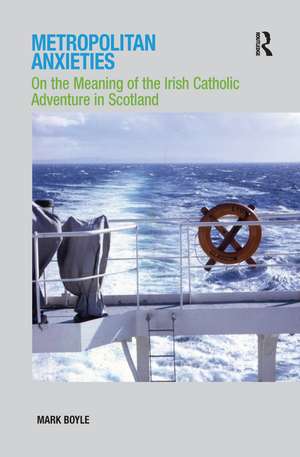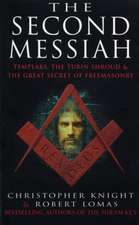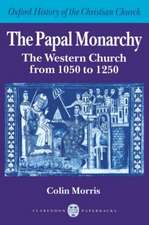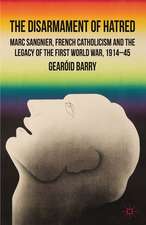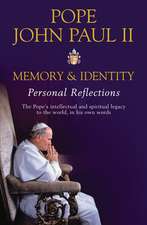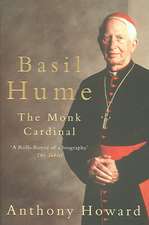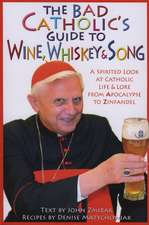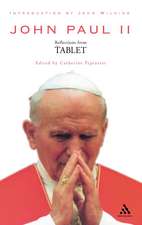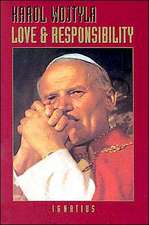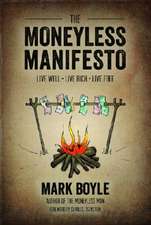Metropolitan Anxieties: On the Meaning of the Irish Catholic Adventure in Scotland
Autor Mark Boyleen Limba Engleză Paperback – 30 noi 2016
| Toate formatele și edițiile | Preț | Express |
|---|---|---|
| Paperback (1) | 196.94 lei 6-8 săpt. | |
| Taylor & Francis – 30 noi 2016 | 196.94 lei 6-8 săpt. | |
| Hardback (1) | 369.73 lei 6-8 săpt. | |
| Taylor & Francis – 28 aug 2011 | 369.73 lei 6-8 săpt. |
Preț: 196.94 lei
Nou
Puncte Express: 295
Preț estimativ în valută:
37.70€ • 40.96$ • 31.69£
37.70€ • 40.96$ • 31.69£
Carte tipărită la comandă
Livrare economică 21 aprilie-05 mai
Preluare comenzi: 021 569.72.76
Specificații
ISBN-13: 9781138251700
ISBN-10: 1138251704
Pagini: 296
Dimensiuni: 156 x 234 mm
Greutate: 0.42 kg
Ediția:1
Editura: Taylor & Francis
Colecția Routledge
Locul publicării:Oxford, United Kingdom
ISBN-10: 1138251704
Pagini: 296
Dimensiuni: 156 x 234 mm
Greutate: 0.42 kg
Ediția:1
Editura: Taylor & Francis
Colecția Routledge
Locul publicării:Oxford, United Kingdom
Cuprins
Contents: Preface: liberating nausea; Provincialising the Scotland's Secret Shame debate: an enquiry into the meaning of the Irish Catholic adventure in Scotland. Part I Topological Mappings and Their Limits: Metropolitan anxieties: a critical appraisal of Sartre's theory of colonialism; The Scotland's Secret Shame debate: approach and method. Part II Topographical Mappings of the Irish Catholic Adventure in Scotland: Prologue: the oral history archive; National identity, estrangement and belonging: who are the Irish Catholics in Scotland?; Imagining home: holidays, the farm, and the craic; The politics of anti-imperialism: activists, agitators, and advocates; Ways of life and the life of ways: culture, faith and family; Immigrant advancement: poverty, education and equality. Part III Cartographical Reflection: Method and Dialogue Under Scrutiny: Masses, spontaneity and tribe: in search of the intelligibility of the Irish Catholic adventure in Scotland; References; Index,
Notă biografică
Mark Boyle is Chair and Head of the Department of Geography at the National University of Ireland, Maynooth.
Recenzii
'The people about whom this book is written come across as real human beings with all their hopes and sentiments, foibles and resentments, connections and alterities, memories and imaginings. This is the first major work by a geographer to apply a Sartrean lens to understand the complexities of human adventure. Boyle expands the Sartrean lexicon to encompass a range of topological and topographical conditions that define human being in situ: on the ground, in the messy, complicated, sometimes tragic and humiliating, but often touching or celebratory situations in which they live their lives and come to terms with what remains of a powerful and resilient colonialism. He shows that historical actions have consequences. Jean-Paul Sartre would surely approve.' Audrey Kobayashi, Queen's University, Canada 'Entangled geographies of Scotland and Ireland narrated with verve and sympathy. Metropolitan Anxieties looks set to become a landmark in Irish studies, postcolonial geographies and diaspora studies.' James D. Sidaway, University of Amsterdam, The Netherlands 'A book of great integrity, rigour and compassion that combines a wealth of original source material and an equally original framework for exploring its subject. An undoubted success in its ambitions to explore the complexity of the Irish Catholic community in Scotland and to develop and deploy Sartre's insights about the possibilities of progressive cultural politics.' Catherine Nash, Queen Mary, University of London, UK 'Mark Boyle offers a refreshing new approach to theoretical understandings of wider issues in the Irish diaspora, which requires careful reading, and a very detailed oral history archive, which is thoroughly documented and will appeal to a wider audience.' Australasian Journal of Irish Studies
Descriere
In a lecture entitled 'Scotland's shame', delivered at the Edinburgh Festival in August 1999, Scotland's leading musical composer James MacMillan sought to expose the continuing pervasiveness of anti-Irish and anti-Catholic sectarianism and bigotry in contemporary Scotland. A decade of heated public debate has followed. The purpose of this book is to harness the complex and rich theory of colonialism which French philosopher, political activist and novelist Jean-Paul Sartre developed and struggled over, to venture a qualified and partial interpretation of the Irish Catholic experience of Scotland.
